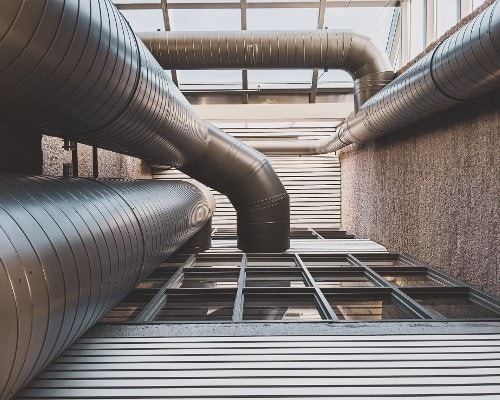Whether it’s a cool breeze on a scorching summer day or a warm gust during a chilly winter night, your trusty HVAC system makes it all possible. But did you know even a minor leak in your HVAC ducts could cost you comfort and inflate your energy bills?
This blog post is your handy guide on how to conduct air duct testing for leaks, ensuring you maintain an optimally functioning HVAC system. We’ve got you covered with easy-to-follow steps to discover if your air ducts are losing their cool (or heat).
So, if you’ve ever scratched your head wondering how to find a leak in an air duct, stick around, and we’ll unveil the mystery together.
Remember, a well-functioning HVAC system is just a call away with River Valley Air Conditioning, Inc. Stay tuned and keep your home’s air system running at peak efficiency!
Understanding Your HVAC System – The Basics
Your HVAC system is like the lungs of your home, and the air ducts serve as vital respiratory passages.
These hidden highway systems within your walls, ceilings, or floors significantly affect your home’s air quality and thermal comfort. Acting as conduits, air ducts transport the conditioned air – either heated or cooled – from your HVAC system into the rooms of your home.
Used air is then recycled back to the HVAC system for conditioning, providing a continuous source of fresh, comfortable air. Acknowledging how air ducts function is the first step toward creating an effective HVAC system – not only can temperature be managed effectively with River Valley Air Conditioning Inc, but they can also help ensure peace and comfort in the home.
Signs Your HVAC Ducts May Be Leaking
Leaks in HVAC ducts often exhibit subtle indications before becoming clearly obvious. Let’s outline some of the key indicators of a leaking duct and what you should keep an eye out for in your system.
- Increased energy bills: If your monthly utility bills have suddenly surged without any significant change in usage, this could be a sign of an air duct leak. An improperly sealed duct allows treated air to escape, causing your system to work harder and consume more energy.
- Uneven heating or cooling: Noticing some rooms are colder or warmer than others? Leaking air ducts may be to blame. When air escapes through leaks, it leads to an uneven distribution of treated air across your home.
- Dusty interiors: Excessive dust in your home can also be a leakage indicator. Leaks can pull dust and dirt from unconditioned spaces into your HVAC system, dispersing it throughout your home.
- Poor air quality: If you’ve noticed a decrease in your air quality or family members displaying increasingly symptomatic allergies, this could indicate a leak in your HVAC ductwork. Leaks can draw in pollutants, allergens, and mold from outside, spreading them within your living spaces.
- An aging HVAC system: Is your HVAC system over 10-15 years old? If so, leaks are likely to develop. Aging components and worn-out sealants can lead to air leakage, causing your system to perform less efficiently.
Air Duct Testing for Leaks – An Expert Guide
While professional assistance is always recommended for extensive air duct issues, you can do a basic leak detection test at home. Here’s a step-by-step guide on how to test HVAC ducts for leaks.
Step 1: Visual inspection
Begin your visual inspection of the ducts by observing their joints, and checking for signs of wear or damage, such as wear, tear or holes. Be sure to wear safety goggles and gloves for added protection!
Step 2: The smoke test
Turn off your HVAC system. Light an incense stick near duct seams and hold it near them; if any smoke wafts into a duct or wavers over time, that could indicate leakage.
Step 3: Pressure test
For a more technical evaluation, using a special fan to pressurize the system can provide more accurate results than simply checking air return and supply registers; any change in pressure indicates leakage in the system.
Step 4: Do the classic hand test
Switch on your HVAC system and place your hand around its ducts; if air starts blowing from them, there may be an air leak somewhere.
Step 5: Professional leak detection
If the leak seems severe or you require a more accurate assessment, hiring a professional leak detection service might be best. They have access to special tools such as the duct leakage tester (DLT). These specialized instruments will give them an accurate assessment of your system.
Detecting and fixing HVAC leaks is crucial for maintaining a comfortable, efficient home environment. Don’t let minor leaks become more significant issues. For assistance with HVAC maintenance or air duct testing for leaks, contact River Valley Air Conditioning Inc today.
Pro Tips for Preventing Future HVAC Duct Leaks
Has your air conditioning been giving you a hard time due to recurring duct leaks? Don’t worry; we’re here with some pro tips that will help you prevent future HVAC duct leaks and keep your system running efficiently.
- Regular maintenance: Keep your HVAC system in top shape by scheduling regular professional maintenance. Periodic inspections can help detect minor problems before they escalate into significant issues.
- Use quality duct materials: Investing in high-quality duct materials is critical. While initial costs might be higher, investing in leak prevention systems will save money in the long run.
- Proper installation: Ensure that your ducts are installed by a professional. Improper installation can lead to loose connections and subsequent leaks.
- Insulate your ducts: By insulating your ducts, you’ll provide an excellent way to stop leaks while also increasing efficiency and cutting energy costs; win-win!
- Seal your ducts properly: Use mastic sealant or metal tape to seal your ducts effectively; avoid using duct tape as it may not last as long.
Prevention is always preferable! By following these tips, you can ensure the longevity of your HVAC duct leaks while creating an energy-efficient home environment that is also cozy.
Need Help Fixing Those Leaky Ducts? Call River Valley Today.
Maintaining your HVAC duct system is key to the comfort, efficiency, and air quality of your home. Regular upkeep with quality materials such as insulation, sealing, and professional installation will prevent leakage that could incur costly repairs later.
Planning ahead allows for an effortless experience and a healthier living environment – reach out to River Valley Air Conditioning’s experts for advice and service today!

